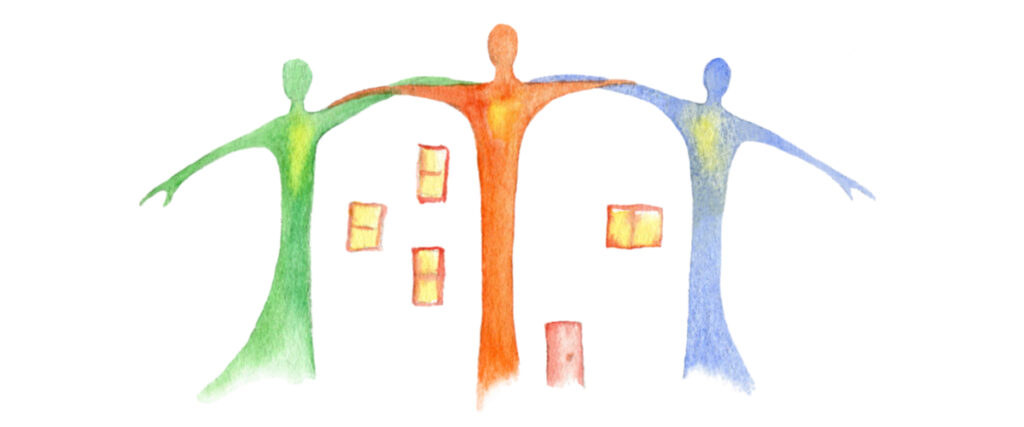East Bay Homebridge Connect is a grassroots group of people both unhoused and housed who support and advocate for people experiencing homelessness.

Lived Experience
People with lived experience of homelessness are critically important in our group and work. Without the input and sharing of life stories from such members, the housed people in the group, who may be better resourced, do not have the wisdom or knowledge to apply their resources or talents and skills in ways that are helpful and treat people with dignity. We firmly believe that in order to offer any effective program addressing homelessness, people who have that life experience need to be among the decision makers. Their knowledge and care for others sharing the experience is indispensable.
Direct Support
Some members of our team are providing direct support, such as bringing food, water, and supplies to unhoused communities. The people who show up regularly to offer help with basic needs, also offer a positive human connection, someone who cares enough to come, and to keep coming. Someone who is listening, witnessing, and then trying to assist and advocate where possible.
Some critics say that this enables people to remain unhoused. People seeking housing in our area wait years and go through a horrifically complex ystem that is crushing to navigate, and little help is offered to navigate it. Some are not considered high risk enough to receive a housing match at all. In our location, a minimum wage job does not afford market rate housing, nor do disability payments, even if one has successfully undergone the difficult process to receive them. People over fifty are the fastest expanding demographic to be unhoused. To deny basic needs, such as food and water, at the same time as denying housing by not allowing it to be built in sufficient quantity, is a cruel torture, even a death sentence.
Advocacy
Advocacy is one of the most important components of our group. Different members have different advocacy strengths, and all are valuable. Some are able to share about their lived experiences. This has resulted in public recognition, career opportunities, and invitations to speak at conferences and panels, be on committees, and serve on boards.
Some are good at letter writing. At times, we are writing to local officials, whether elected or administrative, to bring the perspective to the table that some of our members personally live and other members witness. We are usually not doing letter writing in the form of petitions, sending to political staff who are screening and categorizing incoming messages. Rather, we try to reach people who are reachable as people.
Some have strong networks of relationships and help members of our group to build relationships in new places. Through such efforts, we’ve been able to meet with government administrators and organizers of nonprofits with whom unhoused people are struggling because of policy, or staff, or structural shortcomings.
Some are artists who use their studio practice to bear witness and connect with the public. Sometimes we’ve connected people with legal counsel. Some members have made a point of being present when sweeps or evictions of unhoused people are taking place, to assist people and press back on law enforcement violations of protocol.
Restorative Justice
We alternate our planning meetings with group restorative justice circles. These circles help us in processing the difficulties we experience in this living and witnessing homelessness, and in difficulties we may be experiencing in other parts of our lives. Everything is connected. The circles bring us closer together in an environment that reinforces dignity and care.
We also aim to bring restorative principles to our Homebridge Connect work. We are not looking to make judgments on people but to make healing and restoring broken connections possible. We make space for trauma and the difficult expressions that presents. We try to be present to listen, and to be with others in their own life experiences.
Locations
Presently, Homebridge Connect is operating in the East Bay of the San Francisco Bay Area in California, with most members present in Hayward, Castro Valley, and San Leandro and Oakland.
Participate & Contribute
Wherever you are, we invite you to join us in this work. Here are ways you can:
In the East Bay: We meet weekly on Monday evenings on Zoom, and alternate between planning meetings and restorative justice circles. At planning meetings we share information, experiences, support, and coordinate responses. During the week, we are working hands-on, often in person, in the various ways that different members bring, which are described above in the “Direct Support” and “Advocacy” sections. Sometimes we plan or support events together. We are often loosely in touch with each other during the week. We aim to tap whatever skills and talent any person brings in the way that best aligns with them, and the amount of time each person is able to contribute varies according to their needs. If you interested, contact us and try us out. The more hands working together, the more we can do.
Out of the East Bay, In Person: Connect with us to begin exploring ways that you can reach out in your own area, perhaps form a similar grassroots group that draws from people with lived experiences with allies. Or perhaps connect with a group in your area that is already using these principles. You may want to attend some of our meetings, and you’re welcome to walk with us as your efforts grow and deepen.
Financial Support: Financial support helps us offer survival supplies and emergency aid. You can donate online on our gift page.

